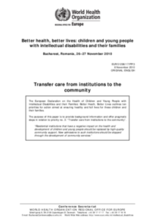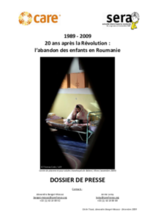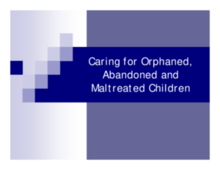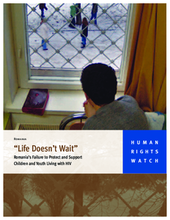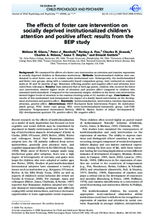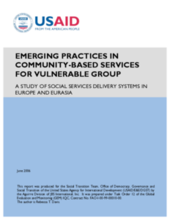Displaying 191 - 200 of 220
This article reviews the series of major changes undergone by the Romanian child welfare system from 1990 to 2010, including the laws and governmental reform measures enacted, the shift in child population among various Romanian institutions and foster care homes, types of institutions available to children, level of care, shift in reasons for child abandonment, changes in ways children are routed through the system, and how these changes have effect children’s development, health, and psychological well-being.
The purpose of this paper is to provide background information and offer pragmatic steps in relation to priority no. 3 of the European Declaration on the Health of Children and Young People with Intellectual Disabilities and their Families: “To transfer care from institutions to the community”. The paper was produced in preparation for the conference in Bucharest, Romania 26-27 November, 2010.
This article explores the experience of institutionalization of Romanian children and Bronfenbrenner’s Ecological System Theory.
Vingt ans ont passé depuis la Révolution de 1989, symbole de la chute du Conducator Nicolae Ceausescu. Pourtant, force est de constater que l’empreinte laissée par la politique pro-nataliste est toujours aussi forte. La Roumanie présente la spécificité d’être le seul pays où les abandons d'enfants aient été encouragés et organisés par l’Etat. Cette politique de Ceausescu poursuivait un triple objectif démographique, idéologique et politique.
In this meta-analysis of 75 studies on more than 3,888 children in 19 different countries, the intellectual development of children living in children's homes (orphanages) was compared with that of children living with their (foster) families.
A resource site based on the first Regional Consultation on Child Care System Reform held in Sofia in early July. The consultation brought together 120 key social welfare delegates from Albania, Bosnia & Herzegovina, Bulgaria, Croatia, UN-administered Kosovo, FYR Macedonia, Montenegro, Romania, Serbia and Turkey.
A powerpoint presentation on the research findings of the Bucharest Early Intervention Project team. Includes comparisons of children raised in institutional care, vs. children placed in foster care, vs. children raised in the community.
This report by Human Rights Watch is based on field research conducted in Bacău, Bucharest, Constanţa, Giurgiu, and Ilfov counties in February 2006, and follow-up telephone and email contacts through June 2006.
The study examined the effects of a foster care intervention on attention and emotion expression in socially deprived children in Romanian institutions
Examines the transition from residential care to family-based, community care models in five European / Eurasian countries.


